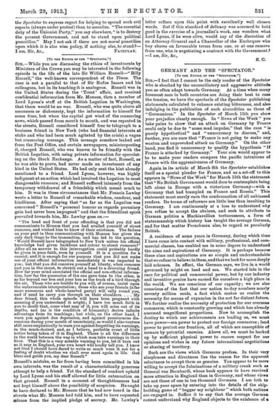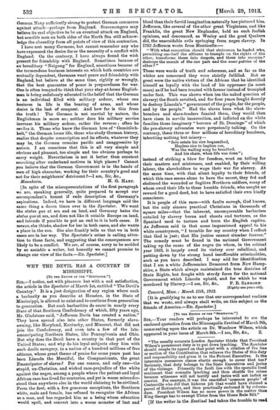GERMANY AND THE "SPECTATOR."
[To THE EDITOR Or THE "SPECTATOE."]
SIR,—I feel that I cannot be the only reader of the Spectator who is shocked by the unconciliatory and aggressive attitude you so often adopt towards Germany. At a time when many foremost men in both countries are doing their best to ease the tension, we have the spectacle of the Spectator publishing statements calculated to enhance existing bitterness, and also indulging in the publication of such absurdities as those of " Germanicus." In the Spectator of March 15th you show your prejudice clearly enough. In "News of the Week" you take pains to show that an attack on Germany by France could only be due to "some mad impulse," that the case "is purely hypothetical" and "unnecessary to discuss," and, further, you are sure that "France is not going to make any wanton and unprovoked attack on Germany." On the other hand, you find it unnecessary to qualify the hypothesis "If France is attacked by Germany." Your aim would appear to be to make your readers compare the pacific intentions of France with the aggressiveness of Germany.
Again in it article of March 8th the Spectator establishes itself as a special pleader for France, and as a set-off to this appears in "News of the Week" for March 15th the statement that "No British Government would dare to contemplate being left alone in Europe with a victorious Germany—with a Germany that had trampled on France and Russia." This statement must surely earn the condemnation of all unbiassed readers. Its terms of reference are little less than insulting to Germany. I am continuously at a loss to understand why you refuse to accept the obvious, and seek to attribute to German politics a Machiavellian tortuousness, a form of statesmanship which history has taught the average German, and for that matter Frenchman also, to regard as peculiarly British.
A residence of some years in Germany, during which time I have come into contact with military, professional, and com- mercial classes, has enabled me in some degree to understand the aims and aspirations of Germany. It is perhaps because these aims and aspirations are so simple and understandable that we refuse to believe in them, and that we look for more deeply laid schemes. In effect, the German says, we live in a world governed by might on land and sea. We started late in the race for political and commercial power, but by our industry and inventive genius have earned for ourselves a high place in the world. We are conscious of our capacity ; we are also conscious of the fact that our nation to-day numbers nearly seventy million souls, a fact which makes us realize the necessity for means of expansion in the not far distant future. We further realize the necessity of protection for our overseas commerce, which is constantly growing and which has already assumed magnificent proportions. Now to accomplish the destiny to which our achievements are leading us, we must have power—sea power to protect our foreign commerce ; land power to protect our frontiers, all of which are susceptible of menace by potential enemies. Above all, we must be backed up by sufficient physical power to ensure respect for our opinions and wishes in any future international negotiations or sharing of territory.
Such are the views which Germans profess. In their very simpleness and directness lies the reason for the apparent reluctance to accept them as genuine. You appear to be more willing to accept the fulminations of a military crank such as General von Bernhardi, whose book appears to have received more attention in England than in Germany, and whose views are not those of one in ten thousand Germans. I am loth to take up your space by entering into the details of the ship- building game of "beggar my neighbour" which both nations are engaged in. Suffice it to say that the average German cannot understand why England objects to the existence of a German Navy sufficiently strong to protect German commerce against attack—perhaps from England. Scaremongers may believe its real objective to be an eventual attack on England, but sensible men on both sides of the North Sea still acknow- ledge the absurdity from all points of view of this contention.
I have met many Germans, but cannot remember any who have expressed the desire for or the necessity of a conflict with England. On the contrary. I have always found the wish present for friendship with England. Sometimes because of an hereditary " Neigung" for England, sometimes because of the tremendous business interests on which both countries are mutually dependent, Germans want peace and friendship with England, but believe at the same time, rightly or wrongly, that the best guarantee of peace is preparedness for war. One is often tempted to think that your stay-at-home English- man is being sedulously educated to the belief that the German is an individual filled with military ardour, whose one business in life is the bearing of arms, and whose desire is the lust of conquest. And how far is this from the truth ! The German is not martial by nature, the Englishman is more so ; neither does his military service increase his military ardour, rather the reverse ; often be reviles it. Those who know the German love of " Gemiitlich- keit," the German home life, those who study German history, realize that despite conscription and its effects, whatever they may be, the German remains pacific and unaggressive by nature. I am conscious that this is all very simple and obvious and pleasant, too simple and too obvious perhaps to carry weight. Nevertheless is not it better than constant searching after underhand motives in high places P Cannot you believe that the German Government is in the hands of men of high character, working for their country's good and not for their neighbours' detriment P—I am, Sir, &c., [In spite of the misrepresentations of the first paragraph we are, speaking generally, quite prepared to accept our correspondent's honest if rude description of Germany's aspirations. Indeed, we have in different language said the same thing a dozen times over in the Spectator. We want the status quo at sea and on land, and Germany hates the status quo at sea, and does not like it outside Europe on land, and intends if possible to put an end to it in both eases. It means, she thinks, shadow for her in both cases, and she wants a place in the sun. She also frankly tells us that we in both cases are in her way. The Spectator's crime is calling atten- tion to these facts, and suggesting that the consequences are likely to be a conflict. We are, of course, sorry to be scolded by so amiable a writer, but honestly we cannot promise to change our view of the facts.—En. Spectator.]











































 Previous page
Previous page